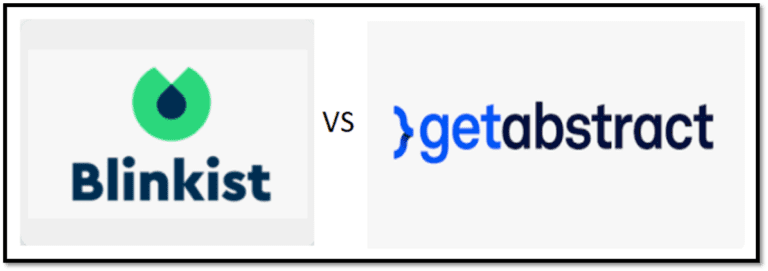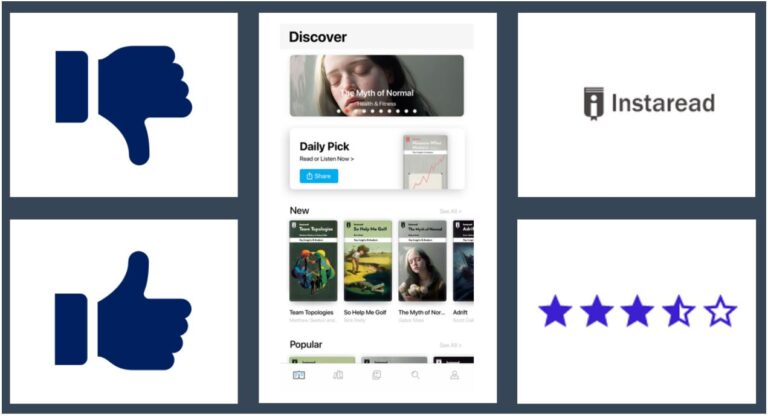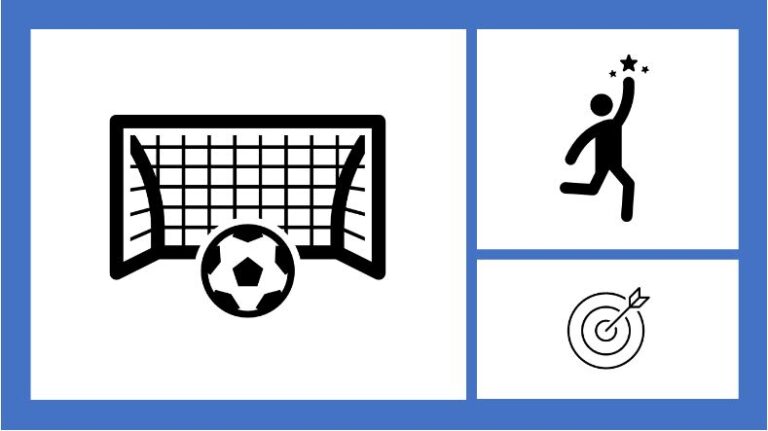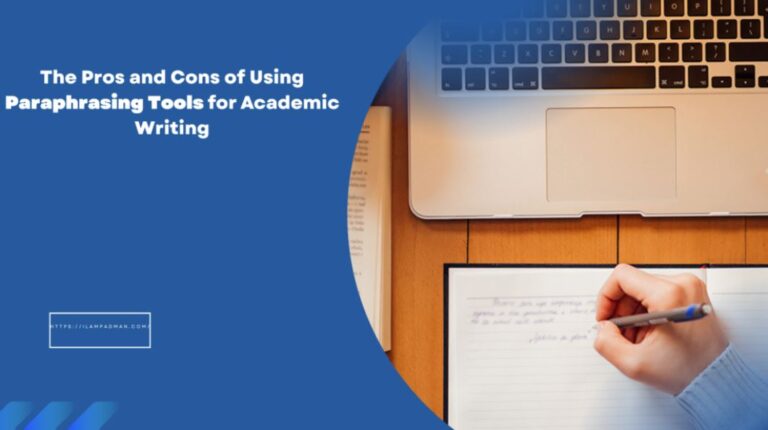Obsidian vs Notion: The Ultimate Note-Taking App Showdown [Aug 2023]
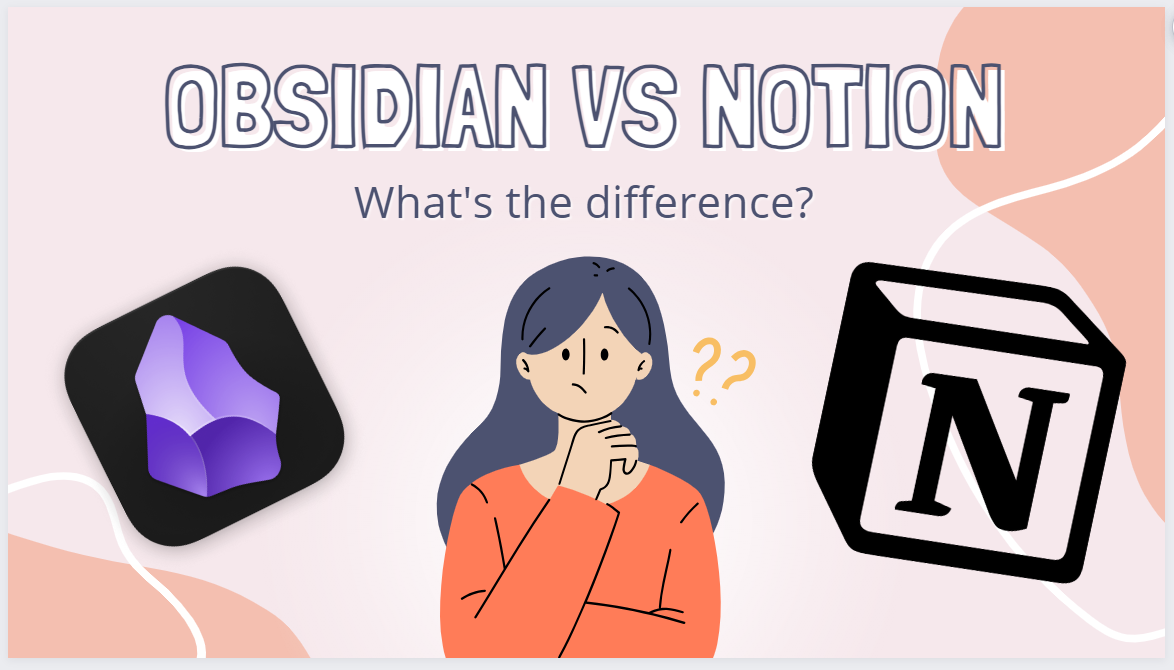
When it comes to finding a productivity tool that meets your note-taking needs, Obsidian and Notion are two powerhouses worth considering. Although they are both helpful note-taking apps, Obsidian and Notion cater to different aspects of organizing and managing information, each with its unique strengths and features. Here’s a breakdown of each app, sectioned into ease of use, key features, pricing, and support.
Markdown Mastery vs Dynamic Collaboration
Obsidian is a strong contender when it comes to Markdown-based note-taking. It’s an offline tool that stores your notes locally, giving you complete control over your data. This can be a game-changer if you’re comfortable with Markdown and prefer having your notes saved directly on your device.
Notion, on the other hand, excels in dynamic collaboration. It’s a cloud-based tool that provides a comprehensive workspace for thinking, writing, and planning. With features like task management, database creation, and wikis, Notion is a versatile tool for team collaboration.
Other posts you may like about Notion!
- Notion pricing – how to pick the best plan for you
- Notion Habit Tracker: How To Get More From Your Time
- 10+ Unique Ways To Use Notion
- 40+ Useful Notion Templates
- How to use Notion planner
- What’s better: Notion vs Evernote
- What’s better: Notion vs Obsidian
Ease of Use: Obsidian vs Notion
When comparing the ease of use between Obsidian and Notion, both note-taking apps offer unique features that cater to different user preferences.
Obsidian: Markdown and Local Storage
Obsidian is built for those who enjoy the technicalities of Markdown. If you’re comfortable with Markdown files and prefer a more hands-on approach to note-taking, Obsidian may be your ideal note-taking tool. Obsidian notes are stored locally in pdf or text format, which means you have full control over your data. This feature is particularly useful for taking class notes or meeting notes offline.
The app’s interface might seem daunting initially, but once you get the hang of it, it becomes a powerful ally in your note-taking endeavors. The Obsidian Vault allows for a seamless organization of your notes. With Obsidian Sync, you can easily sync notes across multiple devices, ensuring you have access to your information wherever you go.
The knowledge graph structure in Obsidian offers a visual representation of your notes and their interconnections. This graph view lets you see the big picture of your notes, making it easier to navigate through your thoughts and ideas.
Notion: User-friendly Interface and Collaboration
On the other hand, Notion is known for its user-friendly interface and dynamic collaboration features. It’s an excellent choice for those who prefer a more visual approach to taking notes, managing projects, or collaborating with other team members.
Notion supports drag-and-drop editing, which makes creating and organizing your workspace notes a breeze. You can also share your notes with others, making it a perfect tool for team collaboration.
Notion’s free plan offers core features sufficient for personal use, with unlimited version history and file storage. For advanced features, the business and enterprise plans come into play. Notion’s Catalyst Plan provides priority support, early access to new features, and a dedicated success manager, making it an attractive option for businesses.
Key Features: Obsidian vs Notion
Each of these robust note-taking applications, Obsidian and Notion, come with a rich set of features catering to different user preferences.
Obsidian: Markdown Mastery and Knowledge Graph
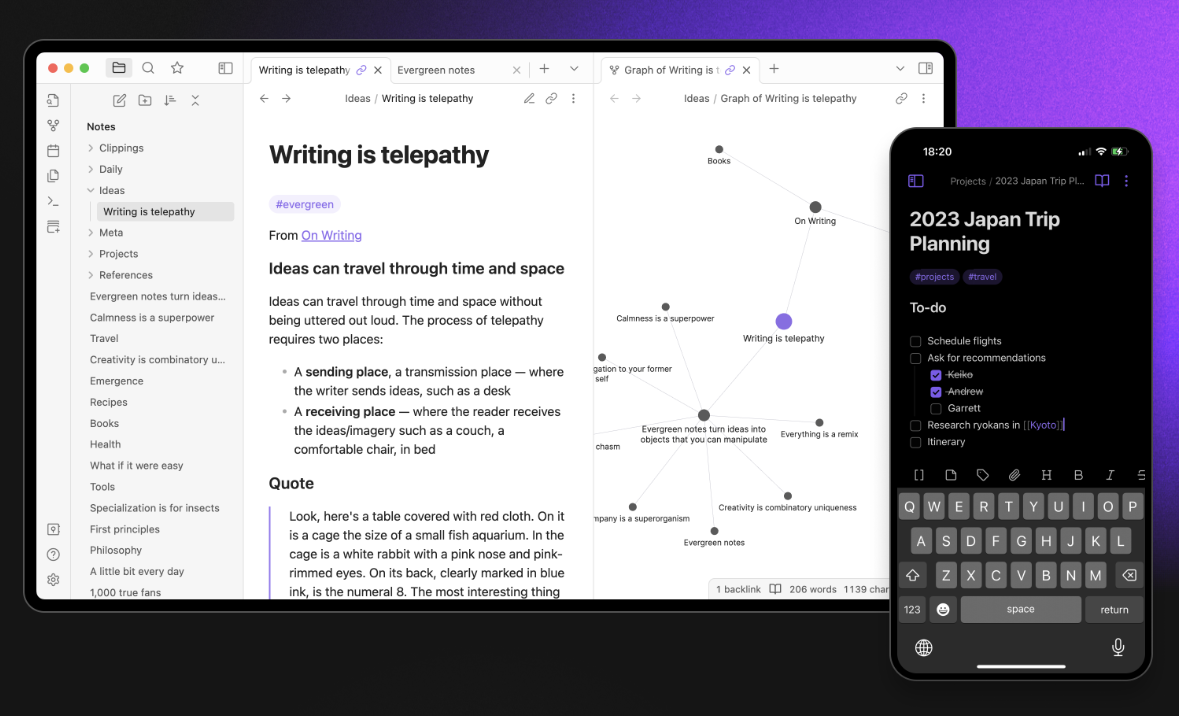
Obsidian stands out due to its strong emphasis on Markdown. It allows you to create and edit notes using Markdown files, offering a more technical approach to note-taking that tech-savvy users might appreciate. This feature caters to those who desire a deeper level of customization and control over their note formats.
One of the unique features of Obsidian is its knowledge graph. This gives users a graphical representation of all their notes and the connections between them. The graph view provides an intuitive way to navigate and understand the structure of your notes, a feature particularly useful when dealing with complex projects or extensive knowledge bases.
Obsidian also offers a commercial plan with advanced features like Obsidian Publish, a separate paid plugin that allows you to share your notes publicly. This can be a significant advantage for researchers, writers, or anyone who wants to share their knowledge with a wider audience.
Notion: Dynamic Collaboration and Versatility
Notion, in contrast, shines in its versatility and collaboration features. It goes beyond a basic note-taking app and offers tools for project management, task tracking, and team collaboration. It’s incredibly user-friendly, allowing you to easily share notes with other team members and collaborate on documents in real-time.
Notion supports a variety of content types, from simple text notes to more complex elements like databases and Kanban boards. This makes it a powerful tool for managing complex projects or creating comprehensive knowledge bases.
Another notable feature is Notion’s block-based structure. Each piece of content you add (be it text, image, link, or even another page) is a block that you can move around freely, allowing for a high degree of customization.
Notion also integrates with popular tools like Google Drive and Google Calendar, adding to its functionality. Plus, with its cloud storage service, you can access your notes from anywhere, making it a great tool for teams working remotely.
Pricing: Obsidian vs Notion
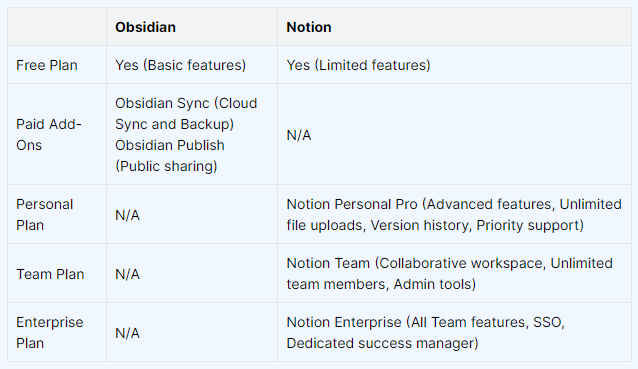
Both Obsidian and Notion offer a range of pricing options to cater to different user needs, from individual note-takers to large teams.
Obsidian Pricing
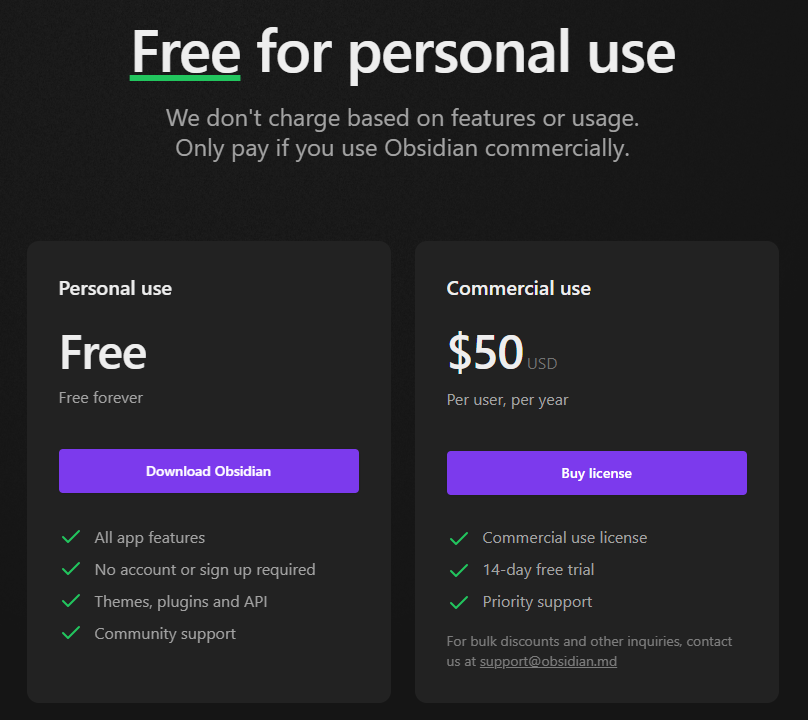
Obsidian operates on a freemium model. The core software is free to download and use, which includes all the basic note-taking features like Markdown support, local data storage, and the unique knowledge graph view.
For users who want to add cloud syncing and backup capabilities, there’s Obsidian Sync, which comes at a separate cost. This allows you to sync your notes across multiple devices and ensures your data is securely backed up in the cloud.
If you want to share your notes publicly or create a personal knowledge base that others can access, you can opt for Obsidian Publish. This is another paid add-on that lets you share your Obsidian Vault with the world.
Notion Pricing
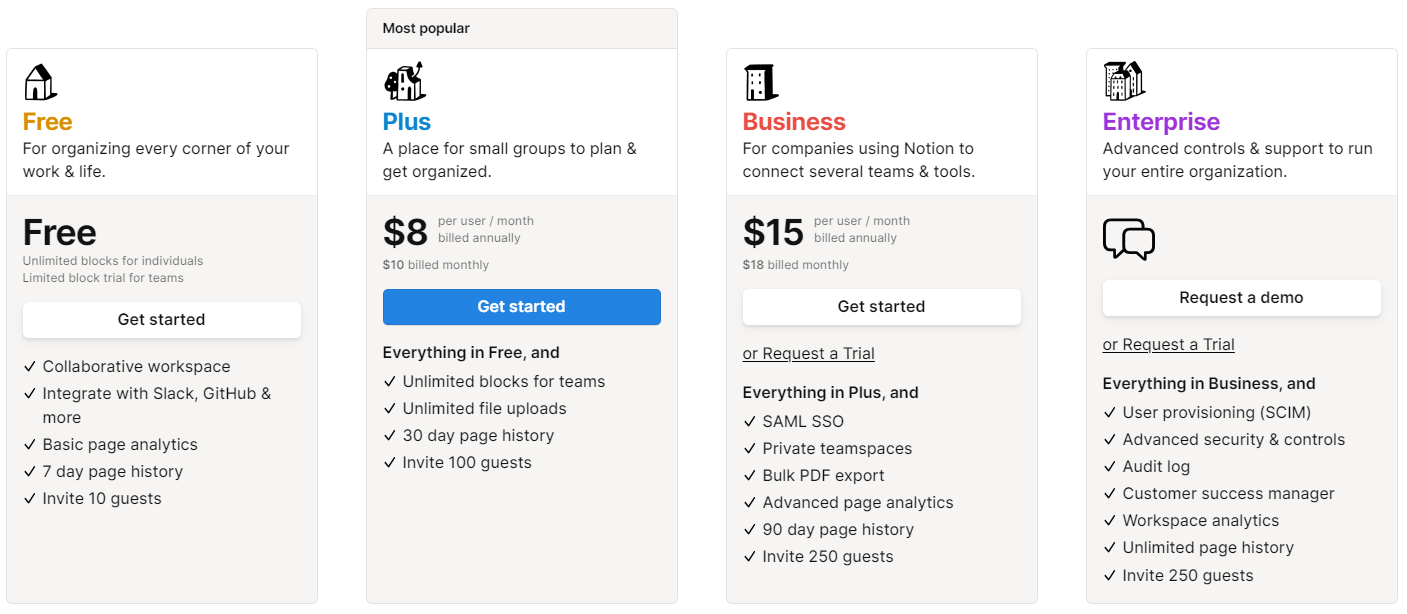
Notion also operates on a freemium model. Its free plan offers a generous range of features, including unlimited pages and blocks, sharing with up to 5 guests, and access to a host of templates.
For individuals who need unlimited file uploads, version history, and priority support, Notion offers a Personal Pro plan. This plan also allows you to share with unlimited guests and gives you access to advanced permissions.
For teams and businesses, Notion has two plans: Team and Enterprise. The Team plan offers everything in the Personal Pro plan, plus collaborative workspace for your team, unlimited team members, and admin tools. The Enterprise plan takes this a step further with SSO and a dedicated manager for account success.
Integrations: Obsidian vs Notion
Integrations are a powerful feature of any productivity tool, allowing for seamless interaction with other apps and services you use. Here’s a look at how Obsidian and Notion handle integrations.
Obsidian Integrations
Obsidian has a plugin-based system that allows users to extend its functionality. There is a growing community of developers creating plugins for Obsidian, which can be easily installed from within the app. Some of these plugins add integration with other apps and services.
For example, there are plugins to integrate with Logseq, which is another popular knowledge management tool, and there’s also a plugin for Trello, a popular project management tool.
Please note that due to Obsidian’s focus on privacy and local data storage, it doesn’t have out-of-the-box integrations with many cloud-based services like Google Drive or Dropbox. You’ll need to rely on third-party plugins or use Obsidian Sync for cloud syncing.
Notion Integrations
Notion offers a range of built-in integrations with popular apps and services. This includes Google Drive, Evernote, Trello, Asana, and more. These integrations allow you to embed files directly into your Notion pages, create dynamic content, and even import data from other tools.
In addition to these integrations, Notion also has an API that allows developers to create custom integrations. The API enables you to connect Notion with other tools in your workflow, automate tasks, and more.
Support: Obsidian vs Notion
When it comes to support, Obsidian and Notion take different approaches that reflect their unique philosophies and user bases.
Obsidian Support
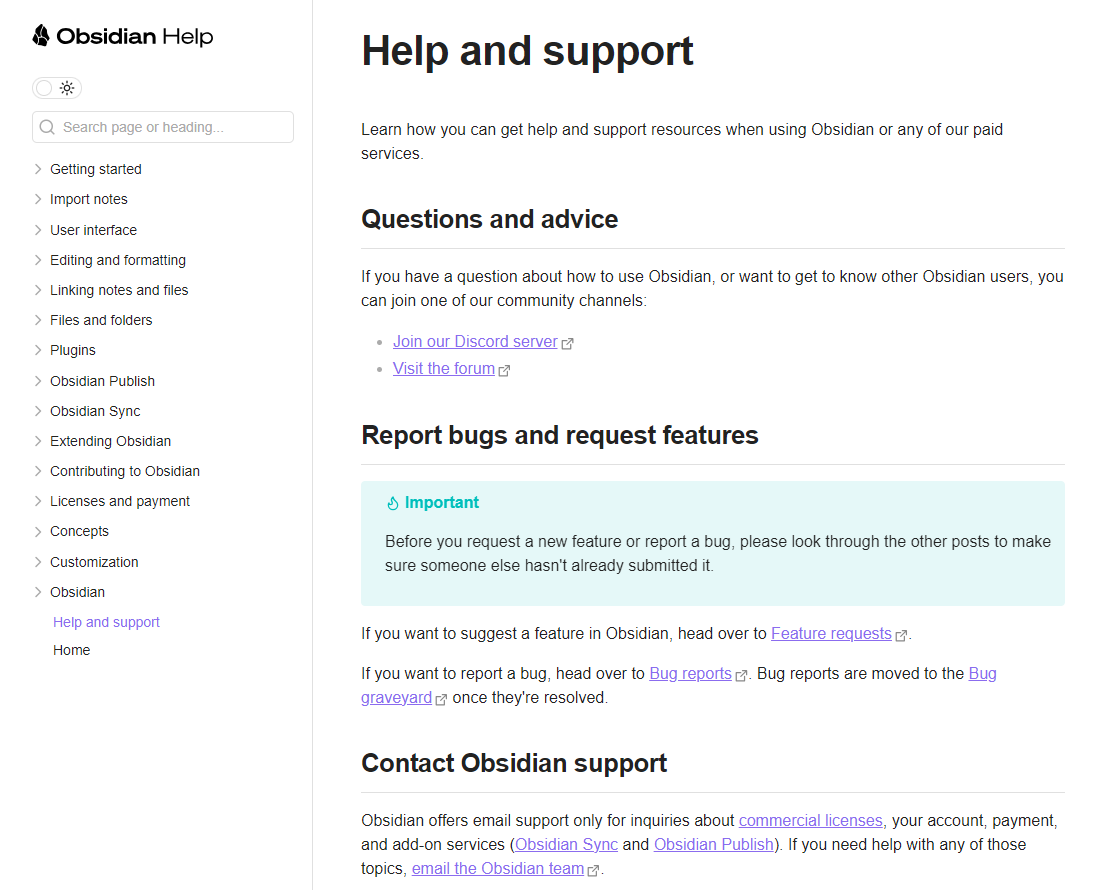
Obsidian’s primary support mechanism is its vibrant and active community of users. This community is a treasure trove of knowledge, experience, and insight into the best ways to utilize this note-taking app. Community support includes forums, how-to guides, and a wealth of user-generated content that covers everything from basic note organization to advanced features like the knowledge graph structure and Obsidian Publish.
Beyond the community, Obsidian offers detailed documentation that covers all aspects of the software, from installation and setup to advanced features. The Obsidian team maintains and updates these resources regularly to ensure they reflect the latest changes and improvements to the software.
While Obsidian does not currently offer priority support or dedicated success managers, they are very responsive to feedback and bug reports, often implementing fixes and new features based on user input.
Notion Support
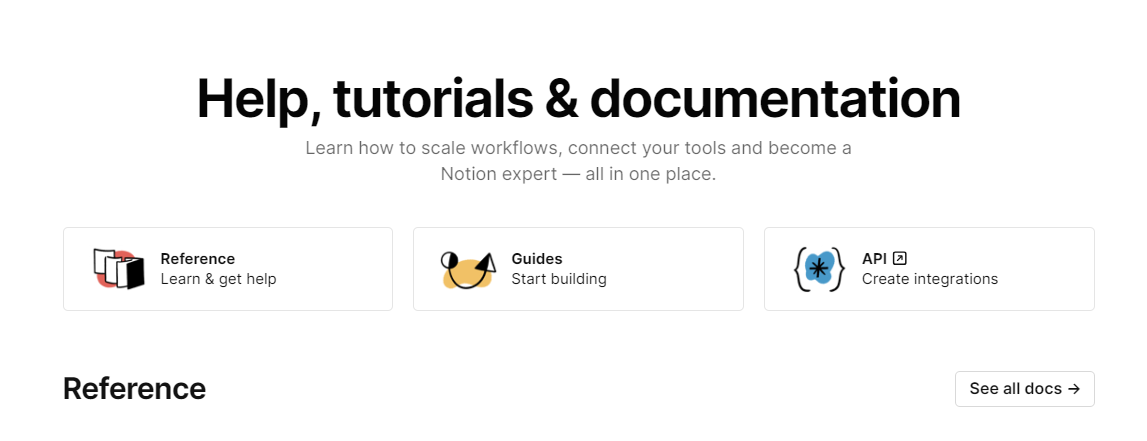
Notion, on the other hand, offers a more structured support system. All users have access to Notion’s comprehensive help center, which features in-depth articles on every aspect of the platform, from note-taking and project management to collaboration features and integrations.
For users on Notion’s Personal Pro, Team, and Business plans, priority support is included. This means faster response times and dedicated assistance for any issues that arise. For businesses with an Enterprise plan, Notion provides a dedicated success manager. This person serves as a point of contact for the company, assisting with everything from onboarding and training to troubleshooting and feature requests.
In addition to these resources, Notion also maintains an active presence on social media and frequently hosts webinars and tutorials to help users get the most out of its platform.
For those who are entirely new to Notion and require assistance in its setup, Notion provides an option to select certified consultants. These professionals can be engaged to aid in the platform’s setup for your organization.
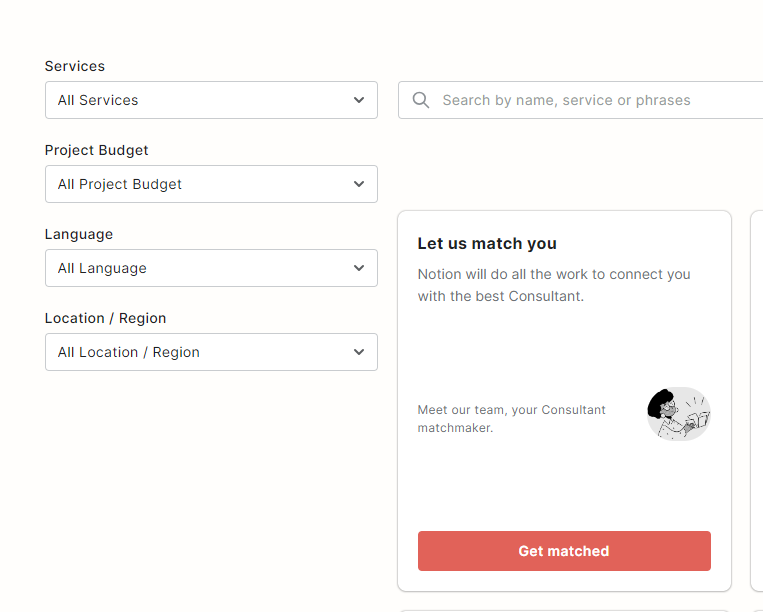
User Feedback: Obsidian vs Notion
User feedback is a critical component in understanding the strengths and weaknesses of any tool. Here’s what users have been saying about their experiences with both Obsidian and Notion.
Obsidian User Feedback

Users of Obsidian commonly praise the application for its flexibility and control over data. The local storage of data, which allows for full ownership and privacy of notes, is highly valued by users who prioritize security.
The Markdown support is also frequently highlighted, with users appreciating the ability to write and format notes quickly and efficiently. The graph view feature, which provides a visual representation of note connections, is often mentioned as a unique and powerful tool for understanding complex information.
Some users, however, express a desire for more built-in integration options with popular apps and cloud storage services. While community plugins offer some solutions, direct integrations would be a welcome addition for these users.
Notion User Feedback

Notion users often speak highly of its all-in-one approach. The ability to manage notes, tasks, databases, and more within a single platform is highly appreciated for its convenience and efficiency. The drag-and-drop interface is also frequently praised for its ease of use and versatility.
Collaboration is another strong point for Notion, with users noting the ease with which they can share and work on notes and projects with others. Integration with other popular apps and services is also a plus, making it easy to incorporate Notion into existing workflows.
However, some users mention that Notion’s rich feature set can be overwhelming for newcomers. Others express concerns about the reliance on an internet connection for accessing notes, which can be limiting for those without constant access to the web.
Final Verdict: Obsidian vs Notion
After a thorough examination of both platforms, it’s clear that each note-taking app, Obsidian and Notion, caters to different needs and usage scenarios. Based on user reviews from producthunt.com, it’s evident that Notion has garnered more ratings and feedback compared to Obsidian. This suggests that the user base of Notion significantly surpasses that of Obsidian, making it more popular between the two platforms.
Obsidian
Obsidian stands out for users who value data privacy, local storage, and markdown support. Its community-based support system is robust and offers a wealth of knowledge. The flexibility of the platform, coupled with its unique features like the graph view, make it an excellent tool for those who prefer a more personal and customizable note-taking experience.
However, its lack of built-in integration options and the need for an internet connection to access certain features (like Obsidian Sync) could be potential drawbacks for some users. The one-time payment model can also be appealing for users who prefer to avoid ongoing subscription costs.
Notion
On the other hand, Notion shines as an all-in-one workspace. Its ability to manage notes, tasks, databases, and more within a single interface makes it a powerful tool for project management and team collaboration. The structured support system, including priority support for premium users and a dedicated success manager for enterprise users, is a definite plus.
The reliance on an internet connection, while a limitation for some, also allows for real-time collaboration and seamless syncing across devices. Notion’s pricing structure, which includes a free plan and several tiered subscription options, offers flexibility depending on a user’s specific needs.
In terms of user feedback, both platforms receive high praise for their distinct strengths – Obsidian for its data ownership and interconnectivity, and Notion for its comprehensive toolset and collaboration capabilities.
In summary, your choice between Obsidian and Notion should be guided by your specific needs, preferences, and workflow. If data privacy and markdown support are paramount, Obsidian may be the way to go. However, if you require a comprehensive toolset that includes tasks, databases, and strong collaboration features, Notion could be the better option. As always, it’s recommended to explore both platforms before making a decision, to ensure you find the best fit for your note-taking needs.
Frequently Asked Questions
What are Obsidian and Notion?
Obsidian and Notion are both helpful note-taking apps that offer features for organizing and managing information.
Can I work with PDF or text formats in these apps?
Yes, you can work with both PDF and text formats in both Obsidian and Notion, making it convenient to incorporate various types of content.
What are special community badges in Obsidian?
Obsidian offers special community badges as a way to recognize and engage with active users within their user community.
Can I utilize Notion without a Notion account?
No, you need a Notion account to utilize the features and functionalities of the Notion note-taking software.
How does Notion support note sharing?
Notion allows users to easily share their notes with others, making collaborative work and sharing of information seamless.
Is Obsidian considered a Notion alternative?
Yes, Obsidian is often considered an alternative to Notion due to its focus on a different approach to note-taking and content organization.
How does Notion handle personal content?
Notion offers personalized note-taking and content organization, allowing users to tailor their workspace according to their preferences.
Is Notion available as a web app?
Yes, Notion is accessible as a web app, making it convenient for users to access their notes from different devices.
What are some key differences between Obsidian and Notion?
Some key differences include Obsidian’s focus on text-based note interlinking, while Notion emphasizes versatile content types and collaborative features.
How does Notion store content?
Notion stores content in a flexible database structure that allows users to organize their information in various ways.
Does Notion have AI capabilities?
Yes, Notion integrates AI capabilities to enhance features like content suggestion and organization.
Here are some helpful career/leadership related blogs
- Careers– Agile Coach, RTE, Product Owner, Scrum Master, QA Manager
- Career development plan
- Career growth
- Career change at 40
- Project Management
- Managing Managers
- IT Career switch
- Software Engineering career path
- Agility, Agile Testing
- Remote leadership / Leadership traits / Agile leadership
Other Productivity / Tools posts that may interest you
- Productivity
- Book summary apps – Headway App vs Blinkist vs getAbstract
- AI Writers: / Blogging – Jasper, Writesonic, Article Forge , Copy AI, Anyword, Writecream, Copymatic, Quillbot, Peppertype, Jasper AI (pricing) &
- Work From Home tools: Jabra
Author also writes at his Medium site.
